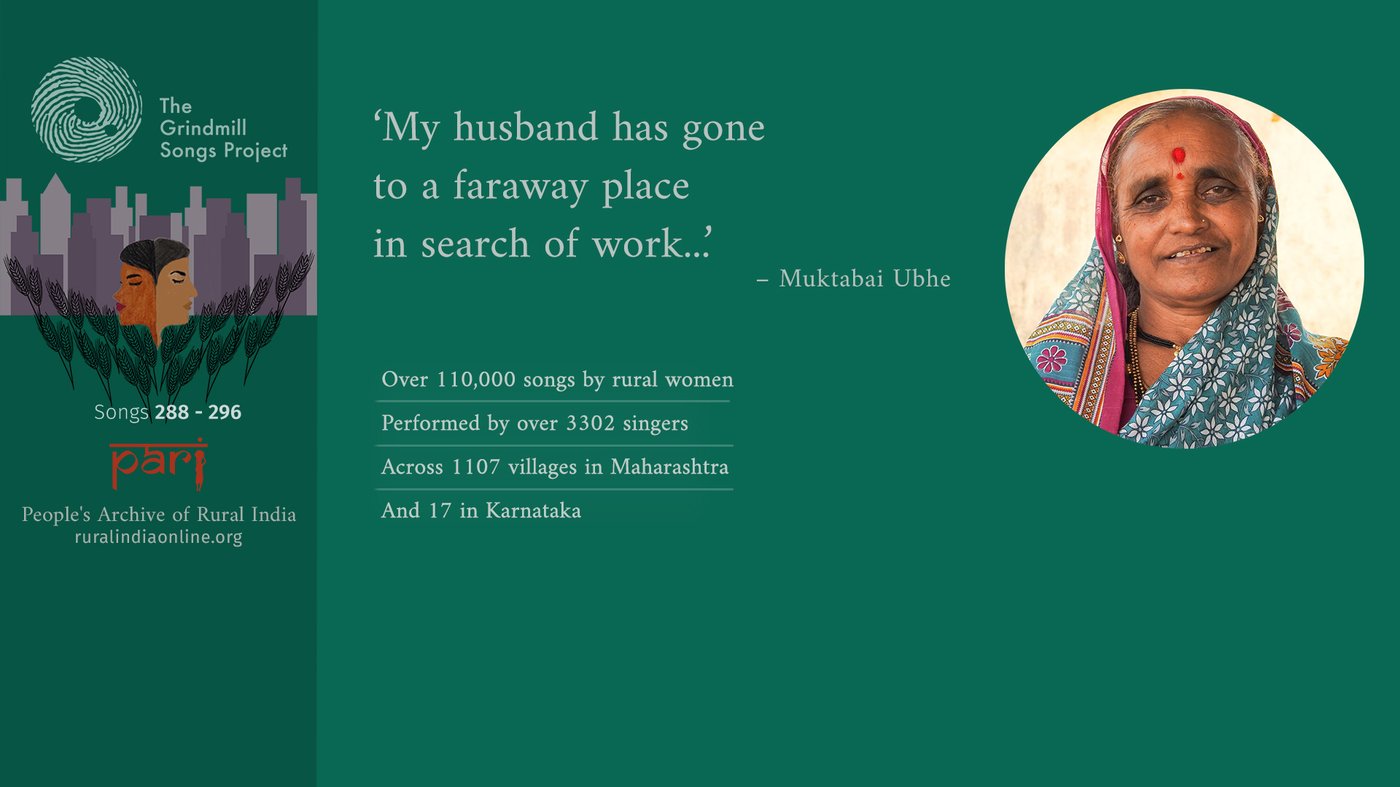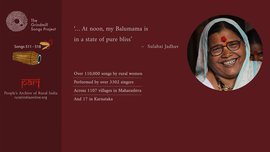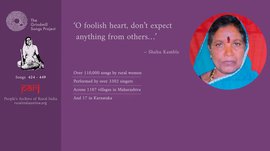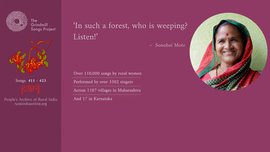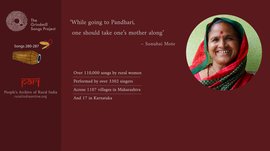Muktabai Ubhe of Khadakwadi hamlet in Mulshi taluka , Pune, sings nine ovi about a wife’s love and longing for her husband, who has gone away in search of work
We didn’t get a good harvest this year
O woman, my husband has gone to a faraway place in search of work
He has gone far away, leaving me alone
There is no one to care for him there
“Yes, I remember singing these songs many years ago,” said Muktabai Ubhe, when we spoke on the phone in late April this year. Muktabai, who lives in Khadakwadi hamlet in Pune’s Mulshi
taluka
, had sung these
ovi
in 1996
for the original Grindmill Songs Project (GSP) team.
In these times of the Covid-19 pandemic and lockdown, the nine couplets sung two decades ago now resonate with the experiences of migrant workers across India, separated from their families in the villages. Like the absent husband of these ovi , the migrant workers too had left their homes in the countryside and travelled to faraway towns in search of work.
Before mechanised mills reached the villages of India around the 1980s, women used to crush grain in the stone grindmill to make flour every day. They worked in twos and threes, in the kitchen or nearby, singing together in their private zone of comfort. There they expressed themselves freely, away from prying eyes and social restrictions. In simple, rhyming ovi, they sang to the rhythms of the grindstone and the jingling glass bangles on their wrists.
Muktabai learned these ovi as a young married woman from her mother-in-law. The couplets express a woman’s feelings of love and longing for her husband – the migrant worker who is far away. When Muktabai sang them in 1996, she was around 40 years old.
Now 64, she laughed heartily when we spoke about the ovi describing the pearl-like lustre of the husband’s eyes, and the blue shade of his skin like the javas (flax) flowers. “I have never seen javas flowers,” Muktabai said, “but in the ovi , the wife praises the husband with much fondness.”
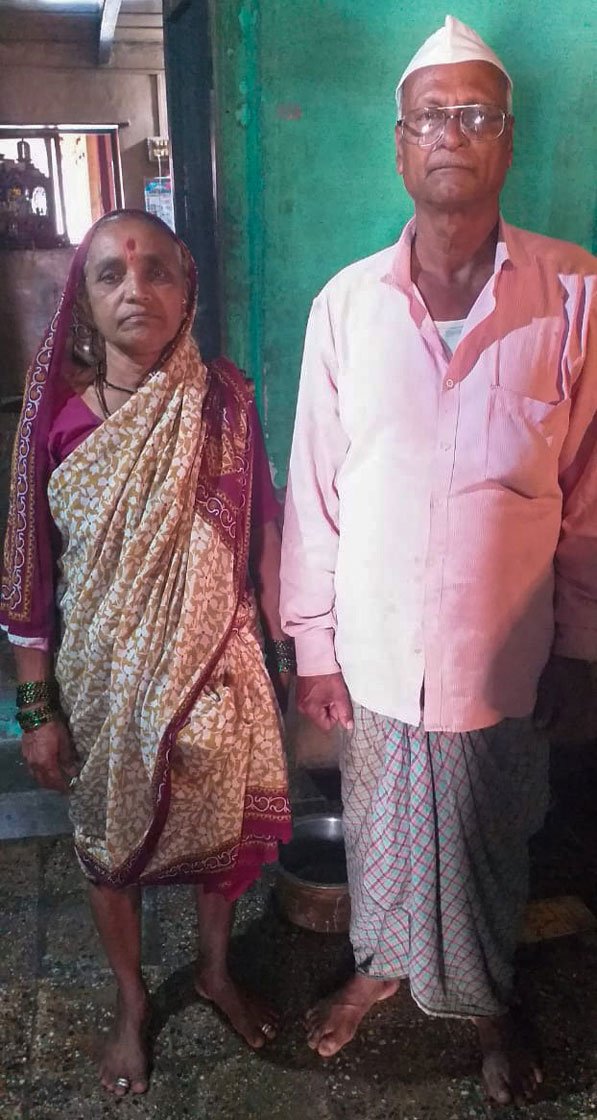
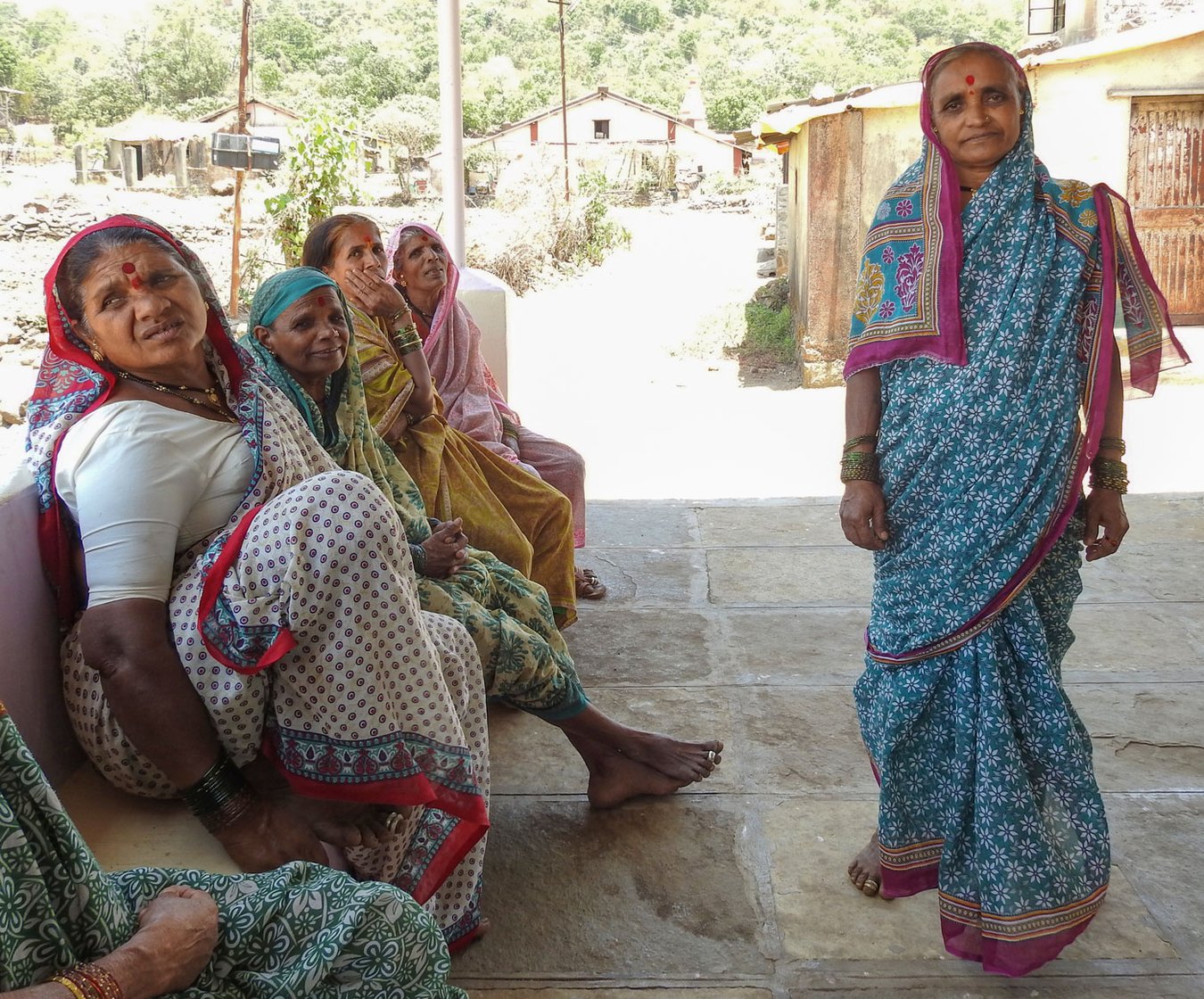
Left: Muktabai and Gulabbhau Ubhe are farmers in Khadakwadi. Right: Muktabai and others in the assembly hall of the Ram temple (file photo)
We spoke about the pandemic and the lockdown. “Everything has shut down because of corona. My husband and I work a little on our farm, but we are both getting old now. We do what little we can,” she said. She and her husband, Gulabbhau Ubhe, who is in his late 60s, own two acres of land in Khadakwadi, a hamlet of Kolavade village. Their son Amol works at an autoparts factory in Urawade, about 20 kilometres from their village. He was at home when the lockdown started in March, but he was called back to work on May 4. The couple’s three daughters are married and residing in different parts of Pune district.
Muktabai is the chairperson of the bachat-gat (self-help group) in her village. “But, like me, most women in the village have no time to spare from their own farm and household work. I merely collect the money from everyone and put it in the bank. There is not much benefit from this post – it is in name only,” she said.
About three years ago, when the PARI GSP team visited Kolavade, Muktabai told us how fond she was of reading books. “I have read Shriman Yogi by Ranjit Desai, and Pandav Pratap Hari and other religious books,” she had said.
We met her and five other singers in the large assembly hall of the Ram temple in Khadakwadi. The breeze blowing from the three open sides of the hall brought us relief on that hot day in April. The fruit-laden branches of the mango trees outside were swaying. The women sang a few ovi about the summer heat and the much-awaited monsoon. We published these songs on PARI in two instalments – Seven songs of summer and Six songs of rain .
In all, 25 women from Kolavade sang 1,265 songs for the original GSP team led by the late social scientists Hema Rairkar and Guy Poitevin. We bring here nine of the 53 songs sung by Muktabai Ubhe, recorded on January 6, 1996.
In the first ovi , the wife worships the deity in her home shrine and prays for the long life of her kunku – the vermilion applied on her forehead, symbolising her husband. In the second couplet, she prays to the pimpal (sacred fig) tree because it represents Lord Vishnu, and asks for a happy married life. In the third couplet, she says that Sukhadeva (god of the morning star) is positioned in the dawn sky above her home, bringing a cool breeze that stings her body.
In the fourth and fifth verses she says that the harvest was not good that year, so her husband had gone far away in search of work. She worries that there is no one to take care of him in that faraway place. These songs tell us of her deep love for her husband and how much she misses him.
In the sixth, seventh and eighth couplets she recalls her beloved and describes his features. His eyes shine like the lustre of pearls, his skin is blue like the javas flowers. (These flowers are often used in ovi to describe the colour of Lord Krishna’s skin.) She sings that her husband’s teeth are as white as washed rice. Without him, she is distraught and lost. And the roasted green chickpeas, his favourite, are all becoming dry.
In the last ovi , she implores him to return: “When will you come, O light of my life? When will you come, O god of my gods?” The singer tells us that her husband means more to her than the god she worships.
Listen to these nine ovi :
सुवासीन पुजते मी घरच्या देवाला
आयुष्य मागते मी माझ्या कुंकवाला
सुवासीन पुजीते मी पिंप ळाचा पार
विष्णुनारायण देवा सुखाचा संसार
झुंजुमुंजु झाल सुखदेव वाड्या आला
पहाटचा वारा कसा झोंबत अंगाला
अवंदाच साल नाही आल पीकपाणी
दुरदेसी गेला बाई माझा घरधनी
दुरदेसी गेला मला एकली टाकून
तिथ जीव लावायला नाही त्याला कोण
राया डोळ्यामंदी तुझ्या मोतीयाच पाणी
राया तुझा रंग जवसाच्या फुलावाणी
राया तुझ दात जस धुतल तांदुळ
तुझ्या बिगर रे मला भरल व्याकूळ
तुला आवडीते हुळा भाजून ठेवीला
काय सांगू बाई सारा वाळून चालला
कवासिक याल माझ्या कुडीतल्या जीवा
कवासिक याल माझ्या देवाच्या बी देवा
suvāsīna pujatē mī gharacyā dēvālā
āyuṣya māgatē mī mājhyā kuṅkavālā
suvāsīna pujītē mī pimpaḷācā pāra
viṣṇunārāyaṇa dēvā sukhācā sansāra
jhuñjumuñju jhāla sukhadēva vāḍyā ālā
pahāṭacā vārā kasā jhōmbata aṅgālā
avandāca sāla nāhī āla pīkapāṇī
duradēsī gēlā bāī mājhā gharadhanī
duradēsī gēlā malā ēkalī ṭākūna
titha jīva lāvāyalā nāhī tyālā kōṇa
rāyā ḍōḷyāmandī tujhyā mōtīyāca pāṇī
rāyā tujhā raṅga javasācyā phulāvāṇī
rāyā tujha dāta jasa dhutala tānduḷa
tujhyā bigara rē malā bharala vyākūḷa
tulā āvaḍīto huḷā bhājūna ṭhēvīlā
kāya sāṅgū bāī sārā vāḷūna cālalā
kavāsika yāla mājhyā kuḍītalyā jīvā
kavāsika yāla mājhyā dēvācyā bī dēvā
I am a
suvasina
[married woman], and worship the god in my house
I pray for the long life of my
kunku
[husband]
I am a
suvasina
praying to the
pimpal
[sacred fig] tree
Lord Vishnunarayan, give me a happy family life
It is early morning, Sukhadeva [god of the morning star] has come above the house
How the early morning breeze is stinging the body
We didn’t get a good harvest this year
O woman, my husband has gone to a faraway place [in search of work]
He has gone far away, leaving me alone
There is no one to care for him there
Dear husband, your eyes shine like the lustre of pearls
Dear husband, your skin is the colour of
javas
flowers
Dear husband, your teeth are like washed rice
I am distraught and lost without you
I roasted green chickpeas for you, because you like it
What can I tell you, O woman, it is all drying up
When will you come, O light of my life?
When will you come, O god of my gods?
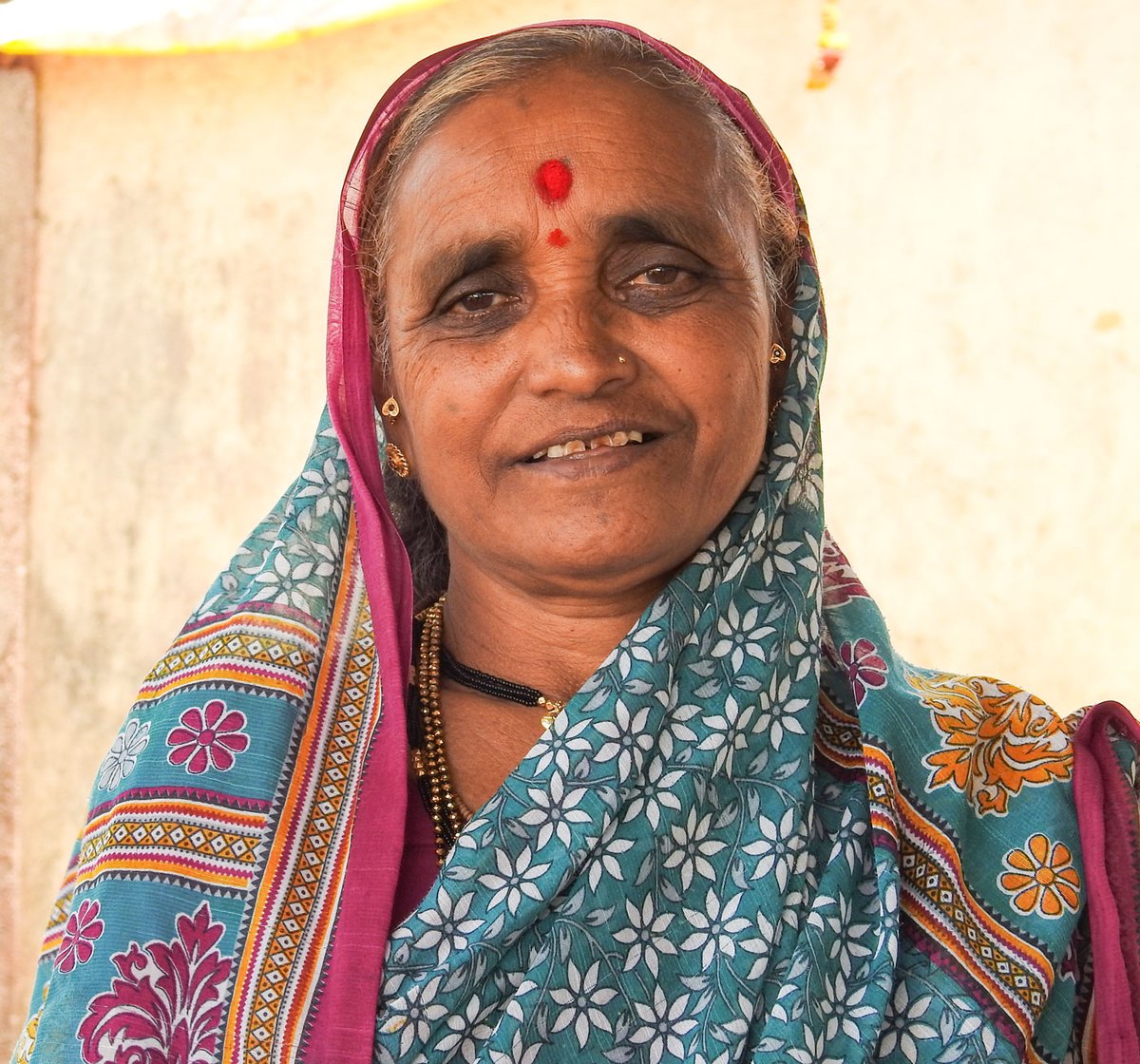
Performer/Singer : Muktabai Ubhe
Village : Kolavade
Hamlet : Khadakwadi
Taluka : Mulshi
District : Pune
Caste : Maratha
Occupation : Farmer
Date : These songs and some of the information were recorded on January 6, 1996. The photographs were taken on April 30, 2017 and May 8, 2020.
Poster: Sinchita Maji
Read about the original Grindmill Songs Project founded by Hema Rairkar and Guy Poitevin.
